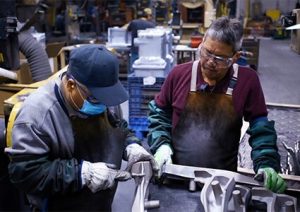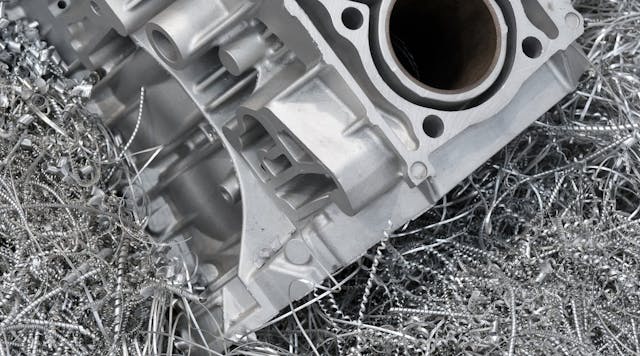Understanding the role of Aluminum Foundry Wisconsin in casting efficiency
Wiki Article
Recognizing the Benefits and Innovations in the Aluminum Foundry Sector
The Aluminum Foundry market plays an important function in contemporary production. Its lightweight buildings notably improve fuel efficiency, specifically in aerospace and auto industries. Furthermore, Aluminum's resistance to corrosion guarantees long life in different applications. As the market develops, technologies such as advanced recycling and additive production are reshaping manufacturing approaches. Exploring these advancements exposes not just the benefits yet likewise the challenges in advance for Aluminum factories in a rapidly transforming market.The Lightweight Benefit of Aluminum
Aluminum's light-weight nature offers considerable benefits throughout numerous sectors, particularly in production and transportation. Its reduced thickness permits the production of components that are simpler to deal with and mount, leading to decreased labor prices and boosted efficiency. In the vehicle sector, lighter vehicles add to improved gas economy and reduced exhausts, lining up with international sustainability goals. In aerospace, the usage of Aluminum lowers the total weight of aircraft, which is vital for improving efficiency and minimizing operational costs.Additionally, Aluminum's lightweight residential properties promote ingenious designs that were previously impractical with heavier materials. This adaptability allows manufacturers to develop complicated shapes and frameworks while maintaining structural honesty. Generally, the lightweight benefit of Aluminum not only improves product efficiency yet also drives improvements in technology and style, making it a preferred material in numerous applications.
Corrosion Resistance and Durability
The Aluminum Foundry sector is renowned for producing products with superior rust resistance, making them optimal for numerous applications. This residential or commercial property, integrated with enhanced architectural stability, adds to the resilient efficiency advantages that Aluminum components offer. Because of this, sectors progressively depend on Aluminum to fulfill demanding environmental problems without endangering high quality.
Superior Deterioration Resistance
While various metals face considerable difficulties from environmental elements, Aluminum stands out for its premium corrosion resistance, making it a favored option in numerous applications. This building is primarily as a result of a natural oxide layer that creates on the Aluminum surface, providing a barrier against dampness and harsh agents. Unlike various other metals that may rust or weaken gradually, Aluminum keeps its stability even in extreme settings, such as seaside locations or industrial setups. Furthermore, its lightweight nature combined with deterioration resistance makes it optimal for applications in aerospace, automotive, and aquatic industries. Generally, Aluminum's extraordinary longevity not only boosts item durability however likewise lowers upkeep costs, providing an engaging advantage for customers and producers alike.Enhanced Architectural Stability
Engineers and developers progressively recognize the relevance of boosted architectural honesty in modern-day applications, where both deterioration resistance and durability are important. Aluminum alloys, known for their lightweight residential or commercial properties, likewise show exceptional resistance to deterioration, making them suitable for extreme settings. The cutting-edge strategies utilized in the Aluminum Foundry market add considerably to generating elements with boosted durability. Advanced casting procedures and alloy make-ups are tailored to meet certain efficiency requirements, ensuring that structures can stand up to extreme problems without endangering stability. Furthermore, surface area therapies and coatings improve the life expectancy of Aluminum products, further reducing deterioration with time. This emphasis on enhanced architectural honesty not only prolongs the use of products but also reduces maintenance prices, solidifying Aluminum's setting as a product of choice in different industries.Lasting Performance Perks
Long-lasting efficiency in Aluminum elements is mostly connected to their remarkable deterioration resistance and durability. Unlike several metals, Aluminum naturally forms a protective oxide layer, which stops rust and deterioration in different environments, consisting of commercial and aquatic settings. This fundamental building substantially expands the life expectancy of Aluminum products, lessening upkeep and replacement prices. Additionally, the lightweight nature of Aluminum improves its applicability across sectors without jeopardizing strength. The material's resistance to use and tear also contributes to its dependability in requiring applications, making it a perfect choice for vehicle, aerospace, and construction markets. As markets significantly focus on sustainability and longevity, Aluminum's efficiency advantages straighten with modern engineering requirements, strengthening its duty in innovative production procedures.Environmental Influence and Sustainability
 As the Aluminum Foundry sector progresses, it significantly prioritizes ecological influence and sustainability, identifying the requirement for accountable methods in the face of climate change. Initiatives to minimize waste and power usage are at the forefront, with several shops embracing reusing initiatives to redeem Aluminum scrap. This not only minimizes raw material use but additionally especially lowers power expense, as recycled Aluminum calls for only a fraction of the power contrasted to primary production.
As the Aluminum Foundry sector progresses, it significantly prioritizes ecological influence and sustainability, identifying the requirement for accountable methods in the face of climate change. Initiatives to minimize waste and power usage are at the forefront, with several shops embracing reusing initiatives to redeem Aluminum scrap. This not only minimizes raw material use but additionally especially lowers power expense, as recycled Aluminum calls for only a fraction of the power contrasted to primary production.Advancements in emissions manage innovations are being executed to lower air contaminants, lining up operations with stricter ecological regulations. Shops are likewise checking out alternate power resources, such as solar and wind, to power their facilities sustainably. By cultivating cooperation with stakeholders, learn the facts here now the sector intends to develop ingenious solutions that enhance eco-friendly stewardship. Jointly, these efforts highlight a commitment to lowering the Aluminum Foundry's carbon footprint while advertising a circular economy within the production industry.
Advanced Production Techniques
 Transforming manufacturing procedures, the Aluminum Foundry industry is increasingly incorporating innovative production methods to improve performance and accuracy. Strategies such as computer system mathematical control (CNC) machining and additive production have actually become essential components in enhancing production workflows. CNC machining enables high-precision element fabrication, significantly reducing material waste and production time. Additive manufacturing opens up brand-new methods for intricate geometries and lightweight styles that were formerly challenging to attain.
Transforming manufacturing procedures, the Aluminum Foundry industry is increasingly incorporating innovative production methods to improve performance and accuracy. Strategies such as computer system mathematical control (CNC) machining and additive production have actually become essential components in enhancing production workflows. CNC machining enables high-precision element fabrication, significantly reducing material waste and production time. Additive manufacturing opens up brand-new methods for intricate geometries and lightweight styles that were formerly challenging to attain.Additionally, the implementation of automation and robotics in Aluminum foundries improves procedures, reduces human error, and boosts employee safety. These modern technologies help with an even more receptive manufacturing setting, allowing producers to adapt promptly to market demands. The integration of innovative simulation software application further boosts the layout and testing stages, leading to remarkable item high quality. Collectively, these strategies not just improve operational efficiency yet likewise foster innovation, positioning the Aluminum Foundry industry at the forefront of modern manufacturing.
Developments in Recycling Procedures
The Aluminum Foundry industry is not only advancing in making techniques however is also making substantial strides in reusing procedures. Technologies are emerging to improve the effectiveness of reusing approaches, reducing energy usage and enhancing sustainability. Advanced sorting technologies, such as automatic optical sorting, allow the identification and splitting up of Aluminum from other products with high accuracy. This brings about a better of recycled Aluminum, which is important for maintaining the integrity of the end products.
Closed-loop recycling systems are being executed, permitting suppliers to reuse Aluminum scrap within their own manufacturing procedures. This decreases my company waste and advertises a circular economic climate. Additionally, research study into new recycling methods, such as hydrometallurgical processes, provides the potential for recuperating Aluminum from intricate waste streams. These technologies not only add to decreasing the carbon impact of the Aluminum Foundry sector but also bolster its financial stability in a significantly environmentally mindful market.
Applications Across Different Industries
Countless industries are increasingly identifying the adaptability and advantages of Aluminum Foundry products, causing prevalent applications across sectors such as vehicle, consumer, construction, and aerospace products. In the automobile market, Aluminum spreadings contribute to light-weight automobile layouts, improving fuel performance and efficiency. Aerospace makers utilize Aluminum components for their strength-to-weight proportion, important for airplane frameworks and parts.In building, Aluminum is favored for its longevity and resistance to corrosion, making it optimal for home window frameworks, roof covering, and architectural supports. Durable goods likewise benefit from Aluminum Foundry items, as seen in cookware, electronics, and product packaging, where light-weight and recyclable products are important.
The flexibility of Aluminum Foundry methods enables for precise requirements and detailed designs, satisfying the varied needs of these sectors. Consequently, Aluminum Foundry items are becoming essential to modern-day production processes throughout numerous markets.
Future Fads in Aluminum Foundries
As sectors proceed to evolve, Aluminum factories are poised to welcome several essential trends that promise to improve effectiveness and sustainability. One prominent pattern is the boosting adoption of electronic technologies, consisting of automation and fabricated intelligence, which streamline operations and improve quality control. In addition, the press in the direction of lasting practices is leading shops to buy recycling technologies, considerably decreasing waste and power usage. Another emerging fad is using advanced alloys and materials, satisfying the expanding need for long lasting and lightweight components throughout numerous industries (Aluminum Foundry). The integration of additive manufacturing methods is prepared for to reinvent part layout, supplying modification and minimizing lead have a peek at this site times.
Another emerging fad is using advanced alloys and materials, satisfying the expanding need for long lasting and lightweight components throughout numerous industries (Aluminum Foundry). The integration of additive manufacturing methods is prepared for to reinvent part layout, supplying modification and minimizing lead have a peek at this site times.Partnership with research establishments is additionally expected to drive technology, as shops seek to develop brand-new procedures and materials. Aluminum Foundry. Collectively, these patterns indicate a transformative future for the Aluminum Foundry market, straightening with wider objectives of sustainability and performance
Frequently Asked Inquiries
What Are the Common Expenses Related To Aluminum Foundry Manufacturing?
The regular costs connected with Aluminum Foundry manufacturing include basic materials, labor, energy, devices upkeep, and overhead costs. These factors collectively affect the general financial investment needed for efficient Aluminum casting procedures.How Does Aluminum Compare to Other Metals in Toughness?
Aluminum, while lighter than many steels, shows outstanding strength-to-weight ratios. Compared to steel, Aluminum is less strong but uses outstanding rust resistance, making it a desirable selection in applications where weight and toughness are essential.What Precaution Remain In Area in Aluminum Foundries?
Safety measures in Aluminum factories typically consist of necessary personal protective tools, air flow systems to regulate fumes, routine devices upkeep, training programs for staff members, and adherence to rigorous security guidelines to lessen dangers related to liquified steel handling.Exactly How Is Top Quality Control Managed in Aluminum Spreading Processes?
Quality assurance in Aluminum casting processes includes strenuous inspections at numerous phases, including basic material assessment, procedure monitoring, and end product testing. Techniques such as analytical procedure control and non-destructive testing assurance adherence to market requirements.What Accreditations Are Very Important for Aluminum Foundry Vendors?
The significance of qualifications for Aluminum Foundry suppliers includes ISO 9001 for high quality administration, ISO 14001 for ecological monitoring, and industry-specific requirements like ASTM and SAE, ensuring compliance, safety, and reliability in making procedures.The Aluminum Foundry market plays an essential duty in contemporary manufacturing. The Aluminum Foundry sector is renowned for generating products with superior corrosion resistance, making them perfect for numerous applications. Reinventing production procedures, the Aluminum Foundry industry is increasingly integrating sophisticated production techniques to improve performance and accuracy. The Aluminum Foundry industry is not just advancing in making methods however is additionally making considerable strides in reusing procedures. As sectors continue to progress, Aluminum foundries are poised to welcome a number of key fads that assure to improve effectiveness and sustainability.
Report this wiki page